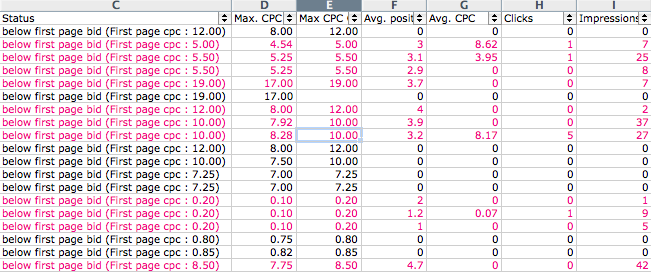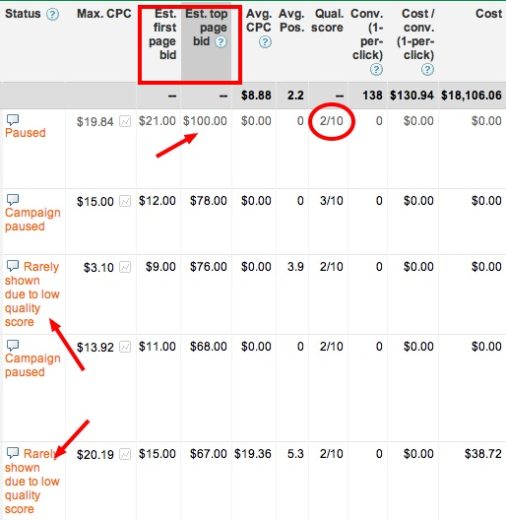If you use AdWords, I’m sure you’ve noticed a status called ‘First Page Bid Estimate’ and maybe even decided to opt in to the newer ‘Top of Page Estimate’ that you can now make a column in your interface. These bid estimates can give some great insight into an optimization opportunity, but it’s also important to know how AdWords calculates these estimates and some alternatives to take rather than constantly raising your bids. In addition, with the new Top vs. Side segmentation that AdWords introduced too, the top of page estimate can help you make a more educated decision on how high to bid up for those keywords that seem to do really well above the search results.
First page bids:
First page bid estimates have always kind of irked me with AdWords. According to their help section, a keyword’s first page bid estimate is an approximate bid needed to reach the first page of Google’s search results. I’ve heard a lot of people say that they’re confused as to why AdWords issues this status for keywords that have an average position that is clearly on the first page of the results, like this example below.
The keywords highlighted in pink are all ‘below the first page bid’ but have average positions that are clearly on the first page.
This second shot is of the keywords that were considered ‘below the first page bid’ three weeks later. The ones I’ve highlighted in pink are keywords that were below the first page in the latter report. They are all branded keywords and the first page bid estimate went from .20 (which I moved them to from .10) to .30 now. This could be the result of an increase in competition for these keywords as they are branded and have decent Quality Scores.
Your estimates are based on a search query that matches your keyword exactly and is based on both Quality Score and competitive atmosphere meaning that your first page estimates may not be completely accurate. So before you get ahead of yourself and continually raise to the first page bid, take a step back and look at what it’s asking you to change – what are the rest of the metrics like in the ad group for this keyword? Like I said, Quality Score is a factor that play a part in these estimates, and you can improve your average position and lower your cost by optimizing your account versus raising your bids.
Top of Page Bids:
A handy, newer feature in AdWords is the top of page bid estimate for your keywords. When Google introduced top vs. side segmentation in your accounts, you were able to see how well your ads and keywords were doing over the top of the search results versus the vertical bar on the side of the results and now, it’s easier to bid appropriately for those keywords to reach the top of the results.
Here’s an example with the estimated top page bid added in. According to AdWords, you’ll sometimes see a bid that has an estimate of $100, which is a hint from the system saying that you really need to optimize this keyword. In other accounts, I’ve noticed a lot of keywords with decent Quality Scores (like 6/7) with pretty high top page bid estimates as well but they’re usually considered ‘low search volume.’ In this example, you can clearly see the dreadful Quality Score of 2 and some nice little statuses from AdWords letting you know how awful the keyword is in terms of QS. Obviously, you’re not going to up the bid for a keyword to $100 and you need to start making adjustments.
Improving Your Rank:
Everything in paid search comes back to your account structure and fundamental best practices. With both first page bid estimates and top of page estimates, we can begin to make improvements and lower CPCs with the structure of our keywords within their ad groups and corresponding ads/landing pages.
Start with the issue – First, look for ad groups with a high ratio of below first page bid estimates and check out the corresponding Quality Scores for those keywords. If you can break out ad groups into smaller, more targeted groups, you have a good chance of improving your QS and average CPC for those keywords.
If you’re seeing a lot of low search volume keywords that are receiving high bid estimates, it may be time to re-evaluate the effectiveness of these keywords and value to your overall account strategy. If you need some ideas on how to further improve your Quality Scores, check out PPC Hero’s Ultimate Guide to Google AdWord’s Quality Score.






